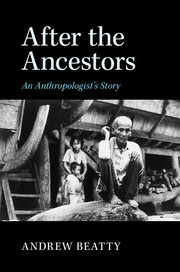Book contents
- Frontmatter
- Epigraph
- Contents
- List of illustrations
- Preface
- People
- Map
- Prologue
- 1 The statue
- 2 House key
- 3 Among women
- 4 Blood brothers
- 5 Daggers and debutants
- 6 Stormy Sunday
- 7 Three things that matter
- 8 The making of great men
- 9 A game of chess
- 10 Cholera song
- 11 Progress
- 12 Brothers and strangers
- 13 Exile and return
- 14 Field work
- 15 The chicken's neck
- 16 Good deaths and bad deaths
- 17 First family
- 18 Blessing
- 19 Half an egg
- 20 Waiting
- 21 Death of a chief
- 22 Ama Jonah at bay
- 23 Unravelling
- 24 The ethnographer and his double
- Epilogue
- Index
14 - Field work
Published online by Cambridge University Press: 05 March 2015
- Frontmatter
- Epigraph
- Contents
- List of illustrations
- Preface
- People
- Map
- Prologue
- 1 The statue
- 2 House key
- 3 Among women
- 4 Blood brothers
- 5 Daggers and debutants
- 6 Stormy Sunday
- 7 Three things that matter
- 8 The making of great men
- 9 A game of chess
- 10 Cholera song
- 11 Progress
- 12 Brothers and strangers
- 13 Exile and return
- 14 Field work
- 15 The chicken's neck
- 16 Good deaths and bad deaths
- 17 First family
- 18 Blessing
- 19 Half an egg
- 20 Waiting
- 21 Death of a chief
- 22 Ama Jonah at bay
- 23 Unravelling
- 24 The ethnographer and his double
- Epilogue
- Index
Summary
Between my finger and thumb
The squat pen rests.
I'll dig with it.
Seamus Heaney, DiggingFollowing our return, fieldwork had taken on a different rhythm; I was now swimming with the current. Language was less of a problem and as people recognized this they no longer simplified or talked down. They could refer to a bridewealth gift or category of debt knowing that we understood and, more importantly, that we understood the weight of such things in the context of a particular relationship. We had their genealogies and biographies mapped out and they knew that we were familiar with the histories of personal antagonisms, land squabbles, and so on, that formed the background of daily life. They also recognized that people had given us conflicting versions of events, genealogies and customary usages and that our perspective on village life – like theirs – drew upon many sources, the most important of which was experience. Ama Darius knew perfectly well that I would not believe he had prayed for the chief's health, but we had reached a stage where he could make this claim and know that I would judge it as a way of talking about his relation with the chief, and of course his relation with me.
The village was a fund of expertise: Ama Festi on hunting, Ina Alani on sorcery, Ama Genoni on housebuilding. But what was more interesting than the cultural rulebook – a fabrication of fieldworker and informant – was the garden of meaning cultivated by the men and women we had come to know so intimately. To enter this garden and taste its fruits you had first to divest yourself of “cases”, “informants” and “examples”, for in plucking out the typical you killed the thing you sought to understand. It was fascinating, certainly, to collect the arcana of hunting – its cosmology, language of euphemism and boar lore (men as God's pigs, God the hunter with his rainbow-net).
- Type
- Chapter
- Information
- After the AncestorsAn Anthropologist's Story, pp. 195 - 209Publisher: Cambridge University PressPrint publication year: 2015

